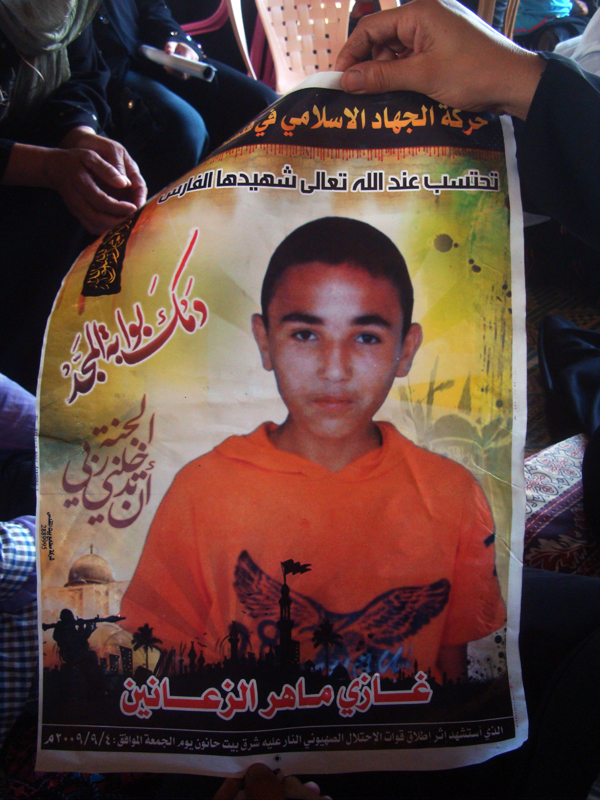Published yesterday (updated) 02/03/2014 11:25

(MaanImages)
GAZA CITY
(Ma'an) -- Large crowds turned out to mourn the death of a 57-year-old
Gaza woman on Saturday, hours after Israeli forces shot her dead as she
walked near the separation barrier in the southern Gaza Strip.
Mourners taking part in the funeral for Aminah Qudeih in the city of Khan Younis called for a response to the killing, demanding Palestinian leadership hold Israeli authorities accountable by appealing for justice at the International Criminal Court.
Although Qudeih was shot by Israeli forces east of Khan Younis late Friday, ambulance crews were prevented from reaching her until Saturday morning, at which time they found her dead.
Abu Anas Qudeih, a relative of the woman, told Ma'an that Aminah had gotten lost on her way home from a party at her neighbors' house.
He added that although she had not approached the buffer zone that Israeli maintains near the border, Israeli forces had opened fire on her as she walked and killed her.
Qudeih added that "the policy of the enemy is blood," adding that Israel "does not understand anything except the language of resistance."


The woman's relatives told AP she was mentally ill, and assumed she wandered toward the border by mistake.
Abd al-Aziz Qudeih, a leader in the Palestinian Popular Struggle Front, condemned the attack, calling upon Palestinian leadership to go the international courts and prosecute Israel for its "crimes."
He said that Israel used a policy of "intimidation" to force Palestinians to flee their lands.
An Israeli army spokeswoman told Ma'an that after telling the suspect to stop, and firing warning shots into the air, Israeli forces opened fire on her "lower extremities."

Israeli forces frequently shoot at farmers and other civilians inside the Gaza Strip if they approach large swathes of land near the border that the Israeli military has deemed off-limits to Palestinians.
The "security buffer zone" extends between 500 meters and 1500 meters into the Strip, effectively turning local farms into no-go zones.
According to UNOCHA, 17% of Gaza's total land area and 35% of its agricultural land were within the buffer zone as of 2010, directly affecting the lives and livelihoods of more than 100,000 Gazans.
Mourners taking part in the funeral for Aminah Qudeih in the city of Khan Younis called for a response to the killing, demanding Palestinian leadership hold Israeli authorities accountable by appealing for justice at the International Criminal Court.
Although Qudeih was shot by Israeli forces east of Khan Younis late Friday, ambulance crews were prevented from reaching her until Saturday morning, at which time they found her dead.
Abu Anas Qudeih, a relative of the woman, told Ma'an that Aminah had gotten lost on her way home from a party at her neighbors' house.
He added that although she had not approached the buffer zone that Israeli maintains near the border, Israeli forces had opened fire on her as she walked and killed her.
Qudeih added that "the policy of the enemy is blood," adding that Israel "does not understand anything except the language of resistance."


The woman's relatives told AP she was mentally ill, and assumed she wandered toward the border by mistake.
Abd al-Aziz Qudeih, a leader in the Palestinian Popular Struggle Front, condemned the attack, calling upon Palestinian leadership to go the international courts and prosecute Israel for its "crimes."
He said that Israel used a policy of "intimidation" to force Palestinians to flee their lands.
An Israeli army spokeswoman told Ma'an that after telling the suspect to stop, and firing warning shots into the air, Israeli forces opened fire on her "lower extremities."

Israeli forces frequently shoot at farmers and other civilians inside the Gaza Strip if they approach large swathes of land near the border that the Israeli military has deemed off-limits to Palestinians.
The "security buffer zone" extends between 500 meters and 1500 meters into the Strip, effectively turning local farms into no-go zones.
According to UNOCHA, 17% of Gaza's total land area and 35% of its agricultural land were within the buffer zone as of 2010, directly affecting the lives and livelihoods of more than 100,000 Gazans.



